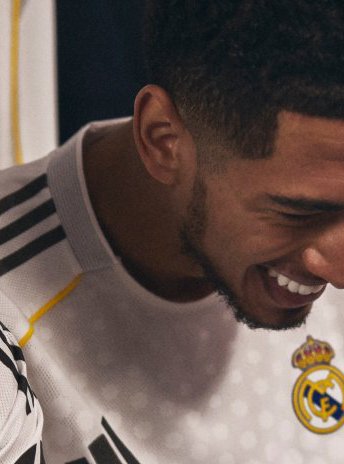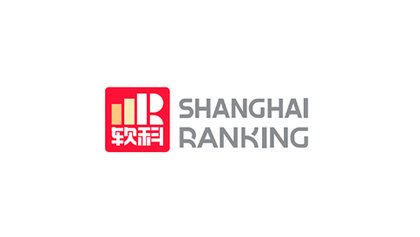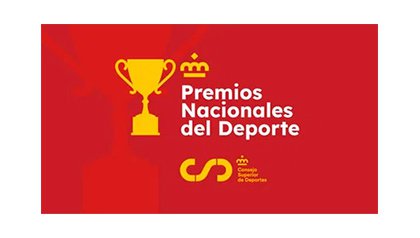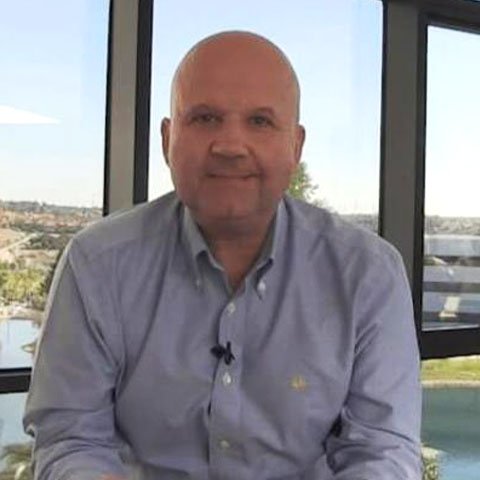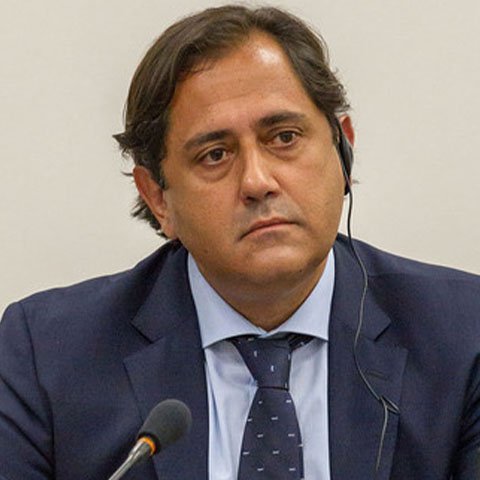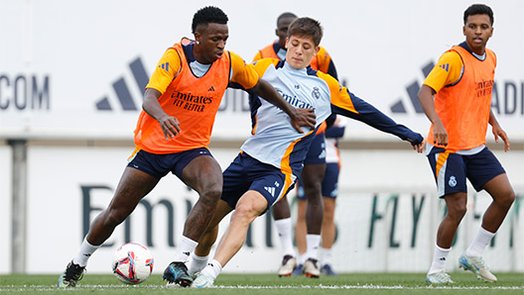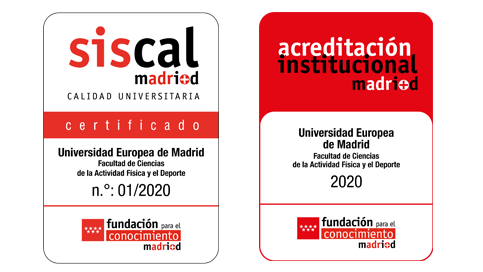Master in Sports Journalism
The Private Master’s Degree in Sports Communication and Journalism at Escuela Universitaria Real Madrid Universidad Europea is a 9-month on-campus program where you will gain a 360º vision of the sports communication industry, learning to create, manage, and deliver stories that connect with audiences across multiple platforms.
What will you experience during the master’s program?
- Attend press conferences with the first-team coach, analyzing and covering key moments in real time.
- Cover first-team matches from the press box at Santiago Bernabéu Stadium or pitchside with exclusive access to take professional photos.
- Take an exclusive tour of the Real Madrid Sports City – Florentino Pérez, including visits to the first-team and academy residences, gaining insight into the inner workings of an elite club.
- Participate in a pre-match security visit at the Bernabéu, understanding the logistics and operations behind world-class sporting events.
During the program, you’ll have the chance to join international trips that showcase the sports industry on a global stage. The Switzerland journey, centered on sports communication, takes you inside FIFA headquarters and the facilities of top clubs like Juventus and Inter Milan, enriching both your international perspective and your career connections.
View the spanish version of the Master: Máster en Periodismo Deportivo.
Private degree issued by Universidad Europea de Madrid
Classes in English | Villaviciosa de Odón | Start: October 2026 | Faculty of Medicine, Health and Sport | Escuela Universitaria Real Madrid Universidad Europea |
The quality you deserve
Explore Escuela Universitaria Real Madrid
Testimonials from graduates of the MA Sports Journalism
Study plan
Syllabus
- Module 1. Sports journalism environment. (3 ECTS)
- Social aspects associated with sport.
- New trends and current status of the sports market.
- Legal bases of sports.
- Economic bases of sports.
- Module 2. Written Press. (6 ECTS)
- News genres in sports journalism.
- Print and digital sports newspapers. Information on football and other sports.
- Sports writing in the general media.
- Regional editions. Specialist magazines. Multimedia environments.
- Agency sports journalism. Internet and combined editing.
- Photography in sports newspapers. Digital design and layout.
- Reporters and special correspondents. Coverage of major sports events.
- Columnist. Evolution and style of sports columns.
- Investigative and data journalism in sport.
- The transfer market in the world of football.
- Module 3. Radio sports. (6 ECTS)
- History of sport on the radio in Spain.
- Sport of the radio today.
- Technological world of today’s radio. Digital content management system and mixer.
- Multi-connection programmes. Sports Carousel.
- Sports radio production.
- Daily sports programmes.
- Radio sports commentating.
- Radio sports interviews.
- Sports and their association with the radio.
- Sports radio and advertising.
- The voice as a communicative tool.
- Module 4. TV and sports. (12 ECTS)
- Current television industry.
- Television audience indicators and workflows.
- Broadcasting rights and relaying of sports events.
- Use of digital camera and lighting equipment.
- Video editing and post-production in television. Editing in Avid.
- Production of sports television formats.
- Production of sports events.
- Creation and development of sports television programmes.
- Preparation of television reports.
- Television presenting. Auto-cue and body language.
- Television sports commentating.
- Television sports information. Sports information models, debate, opinion, interviews and correspondents.
- Module 5. Digital journalism and social networks (9 ECTS)
- Online media world.
- Social networks and new trends.
- The world of sports blogs. Activities and case studies.
- Technological applications in sports journalism.
- Sports website structure.
- SEO positioning in sports journalism.
- Control tools in the use of social networks.
- Social network strategic analysis.
- Community manager sports media.
- Digital marketing on social networks.
- Personal branding and online reputation.
- Advertising strategy in digital media.
- Big Data and viewing data in the world of sport.
- Analytics, assessment and metrics.
- Module 6. Sports communication's management. (6 ECTS)
- Organisational chart and task distribution in a sports club (publications and communication).
- Sports marketing.
- Communication and managerial skills (leadership, decision making, negotiation and crisis management).
- Professions and sports professionals (writing for the radio, the web, press agencies, Real Madrid City training complex and Real Madrid C.F. football and basketball press departments).
- Carrying out press conferences. Relations with sports personalities.
- Sports protocol.
- Module 7. Final project. (6 ECTS)
- Module 8A. Internships I. (9 ECTS)
- Module 8B. Internships II. (3 ECTS)
What you’ll learn semester by semester
1
Semester I
- Explore the environment of sports journalism, including social, legal, economic, and market trends in sport media.
- Master print and digital journalism, learning how to craft stories, chronicles, interviews, and adapting content across platforms.
- Dive into sports radio and television, covering production, narration, live coverage, interviews, editing and broadcast workflows.
- Build expertise in digital media strategies, SEO, social networks, analytics, and multimedia storytelling.
- Learn communication management in sports organizations, including crisis management, protocol, internal and external strategies.
2
Semester II
- Earn real-world experience through internships with sports media outlets and Real Madrid’s communications divisions.
- Create content across media formats—print, radio, TV, digital—in professional settings and live events.
- Develop your Master’s Final Project (TFM), applying your skills in a communication challenge.
Our partners
Agreements with public or private entities for the development of curricular internships.
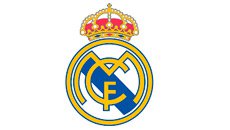
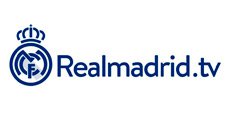
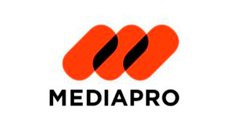
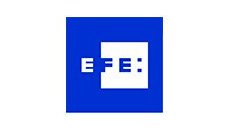
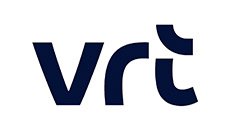
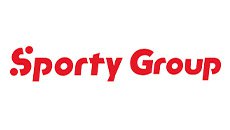
More information
Internships
Internships are a key part of your education, that’s why in this programme 100% of students have the opportunity to carry out internships in collaboration with the Real Madrid communications department, working together in all sports live events of the club teams, beside this you’ll may access to many other sports media companies.
Acquiring experience and putting into practice what you have learnt during your degree is the best way to enter the employment market. There are two types of internship: curricular (which are included as part of your programme) and extracurricular (which you can do on a voluntary basis).
If you want to gain extra work experience before finalising your university studies, you are welcome to carry out extracurricular internships. You can do an internship in whichever year of your studies you choose, but we would like to remind you that they are formative and should complement your studies. The more theoretical knowledge you acquire throughout your degree, the more you will benefit from an internship.
Admissions
Start your future at Universidad Europea
You can become a student at Universidad Europea in three easy steps.
1
Admission exams
Start your admission process by calling +34 918257527 or request information and our advisors will contact you.
2
Place reservation
Once you have been admitted, secure your place by paying the reservation fee.
3
Enrollment
Submit the required documents to formalise your enrollment.
Profile for prospective students and how to access this degree
The Master’s in Sports Journalism and Communications is an opportunity for journalism, social or audiovisual communication graduates to specialise in the sports industry. It is also an interesting option for students from economics, social studies or sports studies backgrounds seeking to form associations with sports journalism and become leaders in the new working environments required by television, radio, digital environments and sports newspapers.
This is an ideal opportunity for graduates seeking a solid specialisation as part of a postgraduate qualification that offers greatly enhanced employment prospects.
Admissions requirements
The admissions process for Escuela Universitaria Real Madrid Universidad Europea programmes runs throughout the year, although enrolment depends on the availability of places.
For personalised guidance, you can go to either of our university campuses (Alcobendas or Villaviciosa de Odón) or contact us via phone: (+34) 91 112 88 50 or e-mail: escuelauniversitariarealmadrid@universidadeuropea.es to receive advice from the Graduate Degree Admissions staff.
Once candidates have received guidance and have provided the necessary documentation, the graduate degree admissions staff shall send them a date for taking the entrance exams for the programme they are interested in, and for a personal interview with the master's programme director or a member of the admissions committee.
The admissions process does not involve any costs or commitment for candidates, until their place has been formally reserved.
Escuela Universitaria Real Madrid reserves the right to cancel or delay the start of a graduate programme if the required minimum number of enrolled students is not met. The University also reserves the right to make any necessary changes in timetables, faculty assignments, locations and campus for any programme. For more information, please check the Graduate School Regulations.
Admissions process
1.Documentation
To begin the admissions process, please first book your appointment online or by calling 34 91 112 88 50.
- Proof you passed the entrance exam
- Two photocopies of your ID
- Administrative student file transfer
- Proof of payment of the admission fee before or on the date of appointment
2.What does the entrance exam consist of?
- Skills and abilities test
- General knowledge test
- Language assessment test
- Personal interview
When do you find out whether you have been accepted?
You’ll find out the result of the entrance exam via an admissions letter that you’ll receive by email. If you have any doubts or queries, you can contact our admissions department for new students at escuelauniversitariarealmadrid@universidadeuropea.es
3.Reserve your spot
Along with the admissions letter, you shall receive an envelope with information about official registration. In order to reserve your place, we recommend responding within seven days of receiving the letter.
4.Registration
All degree programme students attending Universidad Europea for the first time must start a university file prior to registration. The New Students Admissions Department shall provide candidates with all the documentation and forms to complete their registration.
Faculty
Juan Camilo Andrade
Programme director Private Master`s Degree in Communication and Sports Journalism.
Oussama Hammouch
Programme director Private Master`s Degree in Communication and Sports Journalism.
Lorena Almansa
Programme director Private Master`s Degree in Communication and Sports Journalism.
Our faculty
- Juan Camilo Andrade
First Team Press Officer, Real Madrid C.F. - Jorge Pérez
DIRCOM, Real Madrid Basketball - Marta Santisteban
Head of Press, Real Madrid C.F. - Jose Manuel Maza
Legal Consultancy, Real Madrid C.F. - Eric McKee
Staff Writer, Real Madrid TV - Marcel Montealegre
Video Editor, Endemol Shine Group - Alex Kirkland
Journalist, Real Madrid TV, Producer of TheSpanish Football Podcast - Marcos López
Journalist and news anchorman, TVE - Luis Villarejo
Sports Director, Agencia EFE - Juan Antonio Jiménez
Editor-in-Chief, OK Daily - Nacho Martín
Journalist and Cameraman, Agencia EFE - Beatriz Arias
Senior Partnership Manager Entertainment & News, Twitter Spain - Pablo Burillo
Director of the Executive MBA in Sports Management EURM-UE Match Day Director at La Liga - Kendall Crean
Partnership Strategy Manager - Global Partnerships at Real Madrid C. F. - Piti Hurtado
Journalist at DAZN
Professional Basketball Coach - Cristina Delgado Estepa
Partner Manager, YouTube Sports & News - Ángel Martínez
Photographer at Getty Images
Frequently asked questions
What is a master of communication and sport journalism?
A master’s in communication and sports journalism is a programme designed for people looking to combine their passion for the media and communication and sports. The programme immerses students in the sports journalism and gives them the tools needed to succeed in whatever area of journalism and communication they want to work in: as a communication manager, or working on the radio, TV, print press and more.
At Escuela Universitaria Real Madrid, our Masters in Sports Communication and Journalism covers all aspects of the sector – from the different types of press to work in, the importance of digital journalism and social media, and the development of communication and management skills.
If you choose this programme, you will learn from a top faculty made up of experienced professionals and experts in their areas, including the Director of Communication at Real Madrid FC. Thanks to our partnership, you will be able to experience first hand the inner workings of the club and what goes on behind the scenes in the sports communication world.
What can I do with an MA in sports journalism?
An MA in sports communication and journalism will open doors to a number of career opportunities, and you will have the skills and knowledge needed to lead in this ever-changing sector.
Students from this master have gone on to establish successful careers in Spain and abroad in various roles including in:
- Print Press
- Digital Media
- Freelance Journalist
- Press and Communications Departments
- TV
- Press Agencies
- Marketing Agencies
- PR Agencies
- Media Consultant
- Personal Brand Consultant
Who is a master's in sports journalism for?
A masters in sports communication and journalism is aimed at anyone looking to launch their career in the sports media industry.
The programme on offer at Escuela Universitaria Real Madrid is a broad one that will appeal to various profiles, include graduates of degrees in the areas of journalism, social or audiovisual commincation. As there is also an important focus on the business and management side of the sports communication industry, this master’s will also appeal to economic and finance graduates.
Where can I study a master in sports journalism?
Choose Escuela Universitaria Real Madrid and get ahead of the competition thanks you our partnership with one of the world’s most successful and most recognisable football clubs.
Our master’s in sports communication and journalism will equip you with the skills needed to succeed in your chosen profession, whether it is in the print press, TV, radio or with the communication and marketing field. In addition, you will develop key skills such as leadership, management and teamwork – ready to be a future leader in the face-paced environment that the sport sector offers.
Throughout the programme you will be learning from the very best in the industry, including directors at Real Madrid.. You will have exclusive access to events and workshops hosted by the club and Unversidad Europea – such as White Week – a week long event in which the world’s leading sports managers, athletes and professionals attend to network and learn. You will also benefit from the best facilities on offer – both at the Santiago Bernabeu, Real Madrid City training complex, and Universidad Europea’s first class campus.
